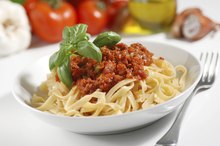What does fact checked mean?
At Healthfully, we strive to deliver objective content that is accurate and up-to-date. Our team periodically reviews articles in order to ensure content quality. The sources cited below consist of evidence from peer-reviewed journals, prominent medical organizations, academic associations, and government data.
The information contained on this site is for informational purposes only, and should not be used as a substitute for the advice of a professional health care provider. Please check with the appropriate physician regarding health questions and concerns. Although we strive to deliver accurate and up-to-date information, no guarantee to that effect is made.
What Food Group Has the Least Amount of Carbohydrates?
Carbohydrates are a big part of the standard American diet and are present in most of the food groups recommended by the USDA at ChooseMyPlate.gov, which now replaces the Food Pyramid. Foods made from grains, such as rice, pasta, bread, breakfast cereals, crackers, muffins and cookies, as well as starchy vegetables, such as corn, potatoes and yams, are rich in carbohydrates. Fruits, milk, yogurt and foods and beverages containing added sugar, such as soft drinks, juices and desserts, also contain carbohydrates. Although carbohydrates are omnipresent in the American diet, several food groups contain no or almost no carbohydrates.
Meat, Poultry, Fish and Eggs
Protein-rich foods do not contain any carbohydrates, whether you choose pork, beef, chicken, turkey, fish, seafood or eggs. However, crab stick or imitation crab is an exception and provides about 15 g of carbs per 3-oz. serving, which is the equivalent of carbs found in a regular slice of bread. Foods that are breaded, marinated or served in a sauce containing sugar can also contain a significant amount of carbohydrates. For example, chicken nuggets, chicken wings, breaded fish and tempura fish contain far more carbohydrates than the plain versions. Some sausages or processed meats sometimes contain flour or sugar, which can increase their carbohydrate content. Read food labels to make sure.
- Protein-rich foods do not contain any carbohydrates, whether you choose pork, beef, chicken, turkey, fish, seafood or eggs.
- For example, chicken nuggets, chicken wings, breaded fish and tempura fish contain far more carbohydrates than the plain versions.
Fats and Oils
Do Milk, Cheese & Yogurt Have Carbohydrates?
Learn More
All the calories provided by fats and oils come exclusively from fat, and both carbohydrates and protein are absent in this food group. If mixed with carbohydrate-containing ingredients, such as in a salad dressing, marinade or sauce, they can provide a significant amount of carbohydrates to your diet.
Nuts and Seeds
Nuts and seeds are not completely free of carbohydrates, but are among the groups of food that contain the least carbohydrates. For example, 1 oz. of raw or roasted almonds contains 6 g of carbohydrates, 1 oz. of walnuts or macadamia nuts provides 4 g of carbohydrates, and 1 oz. of sunflower seeds has 7 g of carbohydrates. Cashews contain slightly more carbohydrates, with around 9 g of carbohydrates per ounce. Nut butter generally contains less than 5 g of carbohydrates per 2-tbsp. serving.
- Nuts and seeds are not completely free of carbohydrates, but are among the groups of food that contain the least carbohydrates.
- Nut butter generally contains less than 5 g of carbohydrates per 2-tbsp.
Nonstarchy Vegetables
What Food Groups Are Carbohydrates Found in?
Learn More
The carbohydrate content varies among nonstarchy vegetables, but is generally lower than 10 g of carbohydrates per serving. Leafy greens and salad vegetables have the least carbohydrates, with only 1 g of carbohydrates per cup.
Cheese
With the exception of cottage and ricotta cheese, which contain up to 5 g of carbohydrates per 1/2-cup serving, cheeses contain very little carbohydrates. Whether you choose cheddar, Parmesan, goat cheese, mozzarella or Swiss cheese, 1 oz. contains less than 1 g of carbohydrates 1.
Related Articles
References
Resources
Writer Bio
Aglaee Jacob is a registered dietitian. She has experience working with people who have diabetes, cardiovascular disease, hypertension and obesity issues. Jacob obtained a bachelor of science and a master of science, both in nutrition, from Laval University in Quebec City, Canada.









